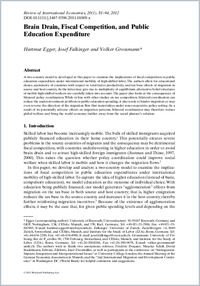Brain Drain, Fiscal Competition, and Public Education Expenditure
BP2-STS
- Egger, Hartmut ORCID University of Bayreuth
- Falkinger, Josef ORCID University of Zurich, CESifo, IZA
- Grossmann, Volker ORCID University of Fribourg, CESifo, IZA
- 2012
Published in:
- Review of International Economics. - Wiley. - 2012, vol. 20, no. 1, p. 81-94
English
A two-country model is developed in this paper to examine the implications of fiscal competition in public education expenditure under international mobility of high-skilled labor. The authors allow for educational choice, asymmetry of countries with respect to total factor productivity, and tax base effects of migration in source and host country. As the latter may give rise to multiplicity of equilibrium, alternative belief structures of mobile high-skilled workers are carefully taken into account. The paper also looks at the consequences of bilateral policy coordination. While in line with other studies on tax competition, bilateral coordination can reduce the under-investment problem in public education spending, it also tends to hinder migration or may even reverse the direction of the migration flow that materializes under non-cooperative policy setting. As a result of its potentially adverse effects on migration patterns, bilateral coordination may therefore reduce global welfare and bring the world economy further away from the social planner’s solution.
- Faculty
- Faculté des sciences économiques et sociales et du management
- Department
- Département d'économie politique
- Language
-
- English
- Classification
- Economics
- License
-
Rights reserved
- Open access status
- green
- Identifiers
-
- DOI 10.1111/j.1467-9396.2011.01009.x
- ISSN 0965-7576
- Persistent URL
- https://folia.unifr.ch/unifr/documents/322929
Other files
Statistics
Document views: 66
File downloads:
- revinternationaleconomics-2012-egger-braindrainfiscalcompetitionandpubliceducationexpenditure: 117
- supplementarydata: 111

